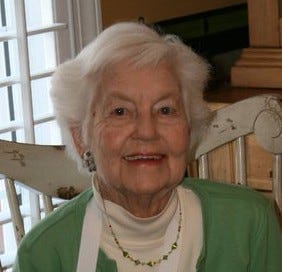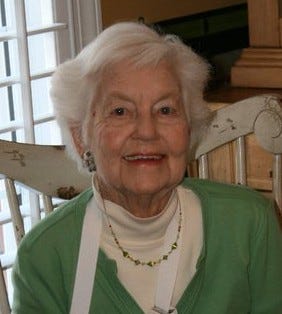I’m not clear on the origins and uses of April Fool’s Day, but my grandmother Evelyn once told me the following story of how she celebrated the day in her childhood.
On April Fools’ Day my grandmother and her sisters packed their lunch pails like any other school day. Their mother walked them to the dirt road and kissed them goodbye, but instead of turning left to walk toward school, the girls turned right toward the train tracks. They walked up the tracks a piece until they got to a little marshy pond, a favorite spot of theirs. They lay beside the pond in their school dresses and watched the clouds drift by and giggled at the thought of their classmates sitting at their desks that bright spring morning. They pulled out their lunches and ate them. It was only nine in the morning, but they felt like eating, and it was April Fools’ Day, and who was going to stop them?
They caught some bugs and picked some wildflowers and got mud on their dresses, and then decided to catch the last half of the school day. So they walked back down the train tracks and up the dirt road toward the school. When they passed the house, their mother waved at them from the porch.
When they got to school the teacher said, “Where have you girls been?”
“At the marshy pond,” they said, “beside the railroad tracks.”
“And why were you at the marshy pond?” the teacher asked.
“It’s April Fools’ Day.”
The teacher made the girls stay in from recess for a couple of weeks–a punishment they willingly accepted. From what I understand, this happened more than once. Apparently it was sort of a Dowdy family tradition, to act the fool on April Fools’ Day, and to receive the punishment for that foolishness without complaint or rancor.
I love that picture of my great-grandmother waving to the little truants as they pass back by. Having given them room to try out a little harmless foolishness, she waves them on toward its logical outcome, not intervening on either end, but rather letting her daughters experience the truth that wisdom and foolishness are a matter of choice, and that choices have consequences.
And since we’re on the subject of my grandmother’s childhood, here’s another favorite story…
My grandmother Evelyn was still a little girl in Pitts, Georgia when her older brothers went to Florida to seek their fortune in the Florida Land Boom. They must have found at least a little fortune, because they sent Evelyn some money on her eighth birthday. She spent it on a correspondence course to learn to play the piano. This in spite of the fact that her family had no piano.
But Evelyn loved beauty, and she believed as firmly in things she couldn’t see as in the things she could. When the correspondence course arrived in the mail, she found a plank and measured and marked the 88 keys of a piano—the white keys and the black keys containing every musical possibility there is…but only in the imagination of a little girl who heard music where others heard silence.
Every day she pounded away on that plank, as faithful to the work as any concert pianist. In time her father, seeing how hard his daughter had worked, figured out a way to buy a used piano on installments, and little Evelyn filled that dusty farmhouse with the hymns of the faith. She served as a church pianist, off and on, for decades to come.
The ancients spoke of the Music of the Spheres—the idea that the planets in their motions create a joyous harmony that we can’t hear on this disordered and discordant planet beneath the moon. We only rarely hear it, but the music surrounds us nevertheless.
I love to think of that little red-haired girl on a hardscrabble farm in Pitts, Georgia (the name of the town sounds like some kind of bad joke), playing that plank in answer to the music of the spheres.
May 19-June 27: The Habit Writer Development Cohorts. A six-week online intensive for writers of memoir and creative nonfiction. Limited to 16 writers. Applications open later this week.
September 14-18: Workshop Week, at Glen Eyrie Castle Conference Center in Colorado Springs, Colorado. A working retreat devoted to workshopping and polishing a completed draft. Cohorts of eight to ten writers will read one another's work and provide feedback in a dynamic group setting. More information at TheHabit.co/Retreats. Six spots remain.
The April Poem-A-Day challenge starts TODAY (go to the Habit Trails subforum on The Habit Forum).
Virtual Writing Rooms on Monday, Tuesday, Wednesday, Thursday and Friday
Thursday Evening: Office Hours
Starting 4/15: Creative Nonfiction Mini-Class - first week’s reading is David Foster Wallace’s essay “Shipping Out” (later published as “A Supposedly Fun Thing I’ll Never Do Again”)
There's a place for you in this vibrant community of writers. Find out more about The Habit Membership here.
Tish Harrison Warren and Doug McKelvey on The Liturgy of the Ordinary (from the Archives)
This archive episode of The Habit Podcast, from the first season, features a three-way conversation between Tish Harrison Warren, Doug McKelvey, and me. Tish is an Anglican priest, a former columnist for the New York Times and Christianity Today, a senior fellow at The Trinity Forum and the author of Prayer in the Night and The Liturgy of the Ordinary. Doug is best known as the author of the Every Moment Holy books. In this episode, Tish, Doug, and I talk about the liturgies of the writing life, finding meaning where it is to be found, and liturgy as a way of making room for mystery to assert itself.








Thank you for sharing these stories of your grandmother's life. I liked your identification of her - "...in her 90's, shortly before her faith became sight."
Thank you.
Thanks JR